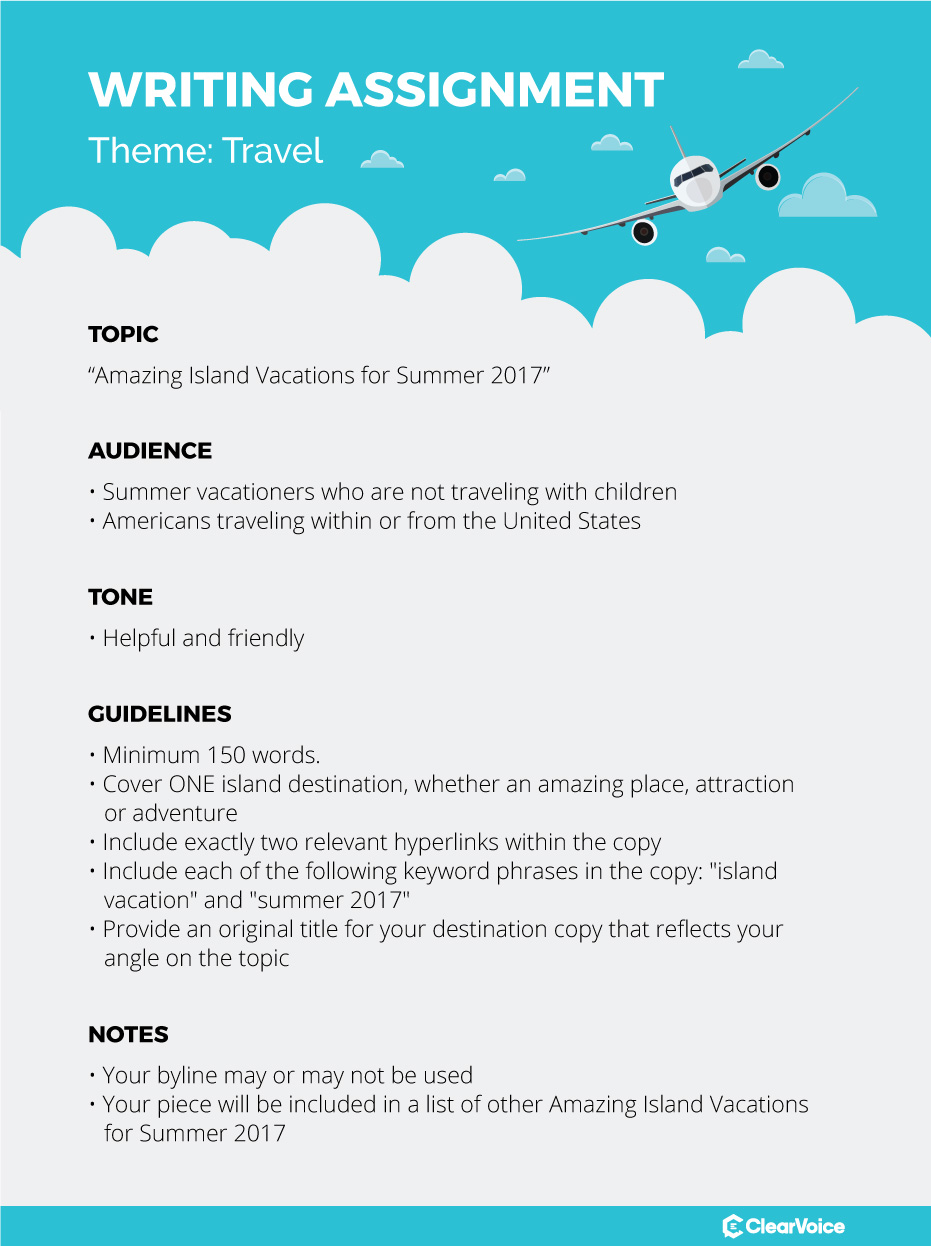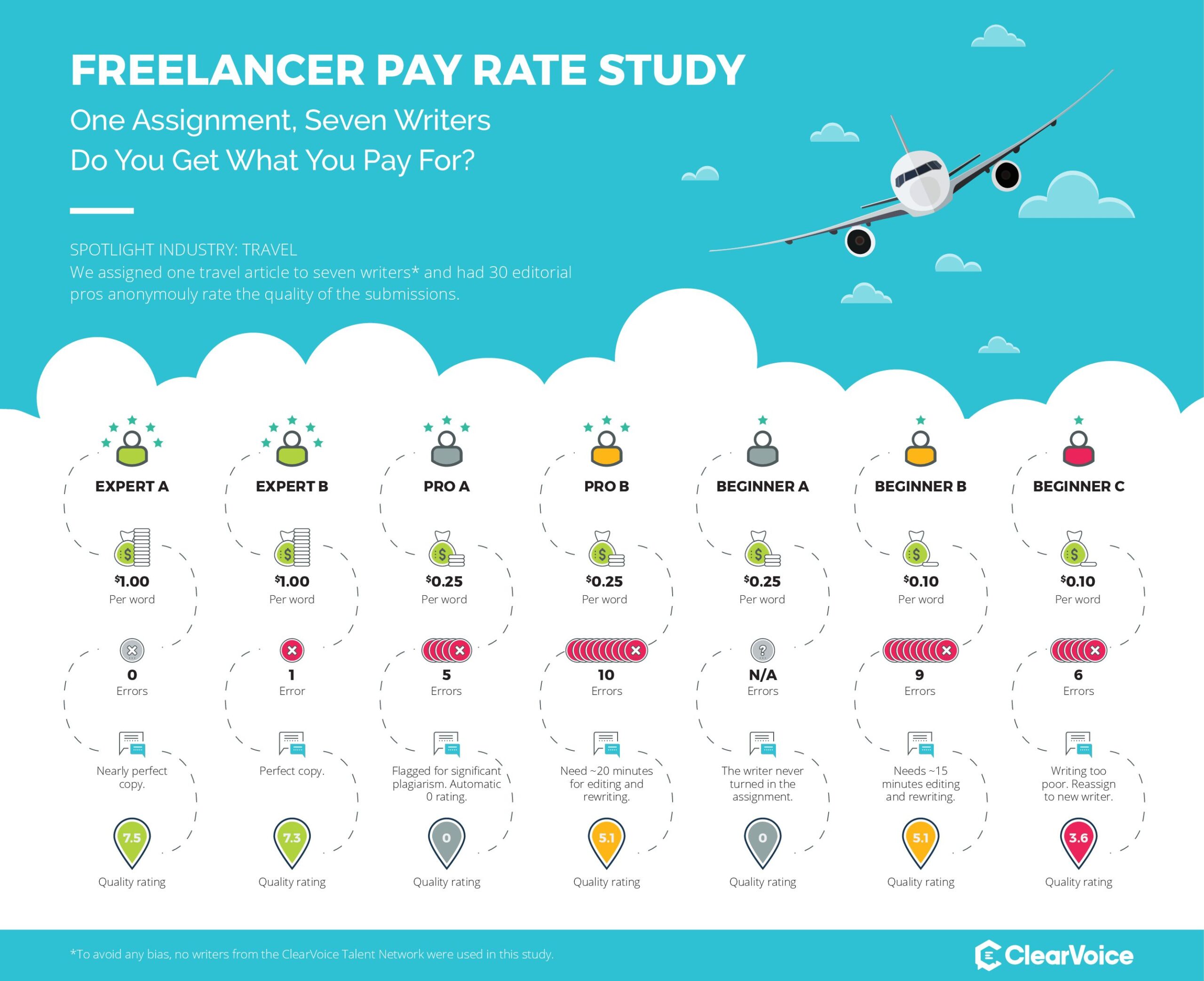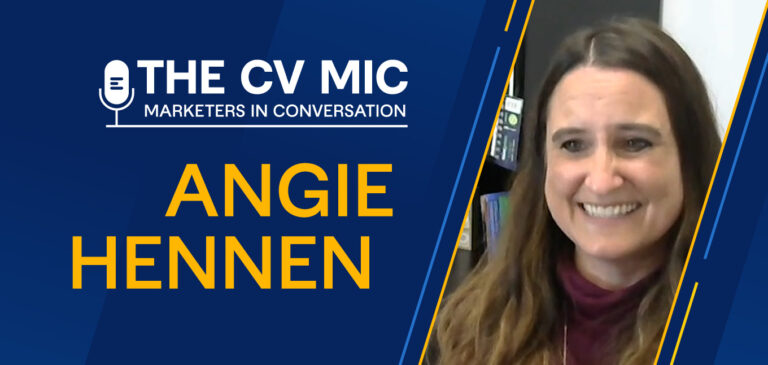How much should you pay a freelance travel writer? It depends on the level of quality you expect for your project. “You get what you pay for” applies when it comes to hiring freelance travel writers as shown through this travel writing assignment experiment conducted by ClearVoice.
At ClearVoice, we see brands and freelancers interact on a daily basis. In fact, writers of all levels, areas of expertise, and educational/professional backgrounds are hired to produce content for brands worldwide.
In a day and age where 35% of the workforce are freelancers, brands have countless options when it comes to hiring a freelancer – and the range of pay rates from freelancer to freelancer varies widely. Many writers will work for next to nothing, while others come at a high premium.
Without a doubt, one of the most frequent questions we hear is: “Do freelance writers who charge more actually produce higher quality content than those who charge less?”
So, we conducted a small study to find an answer, to lend more perspective on how much to pay a freelance writer. With many ClearVoice users in the travel and hospitality sector, we created a mock assignment on travel: “Amazing Island Vacations for Summer 2017.”
Do you get what you pay for when it comes to freelance writing quality?
Hypothesis
Our hypothesis was that a freelance travel writer’s pay rate (cost per word) and editorial quality are correlated.
Methodology
To test our hypothesis, we set out to test six travel writers, with two at each experience/pay-rate level. (Note: We ended up involving seven writers in total because one accepted the assignment but never submitted it.)
- Beginner: $0.10 per word
- Pro: $0.25 per word
- Expert: $1.00 per word
To avoid bias, we did not use any current ClearVoice freelance writers or source writers through our ClearVoice Talent Network.
Beginners and pros were chosen via postings on various writing and job boards. The two experts were chosen from a pool of writers who were verified to have written for highly credible travel publications and media, including Travel Channel, National Geographic, USA Today, Newsweek, Forbes Travel, Where, and Frommer’s.
After the writers were selected, we sent the following assignment guidelines. Writers had three days to complete the assignment, and they were never told that this was part of a study.
Judging
After each writer’s submission was received, 30 editorial professionals judged the quality of the work on a sliding scale from 0 to 10, with 0 being “Horrible” and 10 being “Stellar.” Each submission was judged anonymously, without any indication of the writer’s name or pay rate.
The editorial experts were asked to “rate the overall quality of each submission” based on:
- Grammar and degree of copy editing needed
- Sentence variety and lack of filler
- Readability and logical story structure
- Factual accuracy and specific details
- Trustworthiness and authenticity
- Ability to follow assignment directions
- Ability to meet the deadline
- Overall quality of writing
Aside from the editorial ratings on the copy alone, if a writer missed a deadline without any communication beforehand, an automatic 0 was given (which was the case with one of the seven writers). Any evidence of significant plagiarism also warranted an automatic 0 rating (which was the case with another writer).
Let’s dig into the findings on writer pay and quality…
Our simple study – even though it was relatively small in scale – still validates the commonly assumed correlation of quality and writer pay. So it should come as little surprise that higher wages attract more capable, higher quality, and perhaps more reliable freelance writers – or that writers that charge higher rates do so because they are in greater demand.
Our findings confirm that freelance travel writers who claim to be experts – with a rate of $1.00 per word – showed significantly higher quality, at an average rating of 7.4 out of 10, while beginner writers with a cost per word of $0.10 had an average rating of 4.4 of 10 (2.9 of 10 if you include a 0 rating for the article never submitted). Mid-level freelancers, charging $0.25 per word, had an average rating of 5.3 out of 10 (2.6 of 10 if you include a 0 rating for the article with significant plagiarism).
BY THE NUMBERS: AVERAGE RATING
- Expert: 7.4
- Pro: 5.3 (if the one article had no plagiarism), 2.6 (if including a 0 rating for the article with plagiarism)
- Beginner: 4.4 (for submitted articles), 2.9 (if including a 0 rating for an article never submitted)
Expert
- The average time to copy edit an expert’s content was less than five minutes for each expert submission.
- One expert submission had zero copy errors, while the other had just one.
- Both submissions were written in a very clean, journalistic manner.
- The expert writers clearly presented details and context for the reader in a way to help them envision their experience on an island vacation.
Pro
- The pro submissions averaged 7.5 errors, and the average rating was 5.3 (or 2.6 if you include a 0 rating for the article with plagiarism).
- Copyscape flagged one submission for plagiarism.
- The editors also remarked the time to copy edit without plagiarism would have been five minutes, but with it would be a 20+ minute edit, while the other submission was a 20+ minute edit.
- Both pro writers were cited to not provide a cohesive story and called out unimportant and disjointed facts about the island destinations covered.
Beginner
- The average rating for beginner writers was 4.4 (or 2.9 if you include the 0 rating for article never submitted), and the submissions were not up to par with the other levels.
- The average time to edit the submissions was 15+ minutes, where the experts took less than five. In addition there were, on average, 7.5 copy errors in each submission.
- The copy editors remarked that both beginner submissions were amateurish, poorly written, and lacked a cohesive story structure, even citing that they would reassign one article to another writer because the writer wouldn’t be capable of a competent revision.
- In addition, the first beginner writer assigned accepted the assignment but never turned it in – further proof that higher-fee writers are more accountable.
Storytelling is key, and lacks with low-tiered writers
Expertise for the travel genre is the ability for a writer to tell a story about their experience in a place – or at least convince the audience they’ve been there. So we were not surprised the key issue with the lower-rated submissions was that they lacked good storytelling. And it makes sense… If you’ve never actually been to the place you’re writing about, then it would be apparent you wouldn’t have an authentic story to share.
The notion that good storytelling is the best sign of expertise is something that might apply to writing for any industry. If you pay more for an expert writer – for their expertise – you’re more likely to get better storytelling as a result because…
The takeaways of our travel writing study
For freelancers…
As a freelance writer, think long and hard about your rate. Look into resources on freelance writing rates and industry averages, and pair your years of experience with your rate. For example, a beginner who has zero to three years of experience averages $0.05 to $0.08 per word, while an expert with more than seven years of experience can demand $0.75 to $2.00 per word.
For brands…
If you are a brand, don’t hesitate to hire high-quality, more expensive writers. Expert writers have a higher likelihood of telling a compelling story. Plus, you will eliminate long editing times and the headache of having to coach novice writers.
Remember: Hiring freelancers is almost always cheaper than hiring a traditional employee. Even if a freelancer’s rate is high, you’re not on the hook for providing benefits or long-term employment. So, if you’re looking to find high-quality freelance copywriters, take the following next steps:
- Develop editorial guidelines for your brand content.
- Develop detailed campaign details for your brand’s content campaign so writers have a clear understanding of what’s demanded of them.
- Get matched with freelance writers in the ClearVoice Talent Network.
- Ask your professional network for recommendations or reach out to freelancers contributing to other industry publications or blogs.
And the top submission…
Although we won’t post all the submitted articles, we thought we’d at least share the one that received the highest overall quality rating. It is summer after all!
The Beach and Beyond: The Vacation Paradise of Spain’s Gran Canaria
One of Europe’s most popular destinations for an island vacation, Spain’s Gran Canaria is a veritable year-round outdoor playground, thanks to its location just off the African coast.
More Variety for Your Vacation
Most of the island’s four-million-plus annual visitors come for the beach life, but the varied topography provides far more options than other Canary Islands, even perennial tourist favorites Tenerife and Lanzarote. Known as a “miniature continent,” Gran Canaria boasts postcard-perfect beaches, picturesque mountain towns (every photo you snap in Teror will cause instant Instagram envy), and even a bustling capital, Las Palmas, with historic neighborhoods dating back to the days when Christopher Columbus dropped anchor in the city’s harbor.
Endless Summer
Although you can’t go wrong visiting the Canaries any time of the year, summer does have its perks. Much like Hawaii’s Big Island, Gran Canaria has numerous microclimates, with cooler temperatures in the north and mountain regions even as thermometers in southern resorts read 10 or more degrees (Celsius) warmer. A non-stop calendar for summer 2017 features events ranging from theater and numerous music festivals to one of the world’s most renowned windsurfing tournaments.

Looking for writers who know how to cover the world? Hire vetted travel writers who are part of the ClearVoice Talent Network. Get started now!






